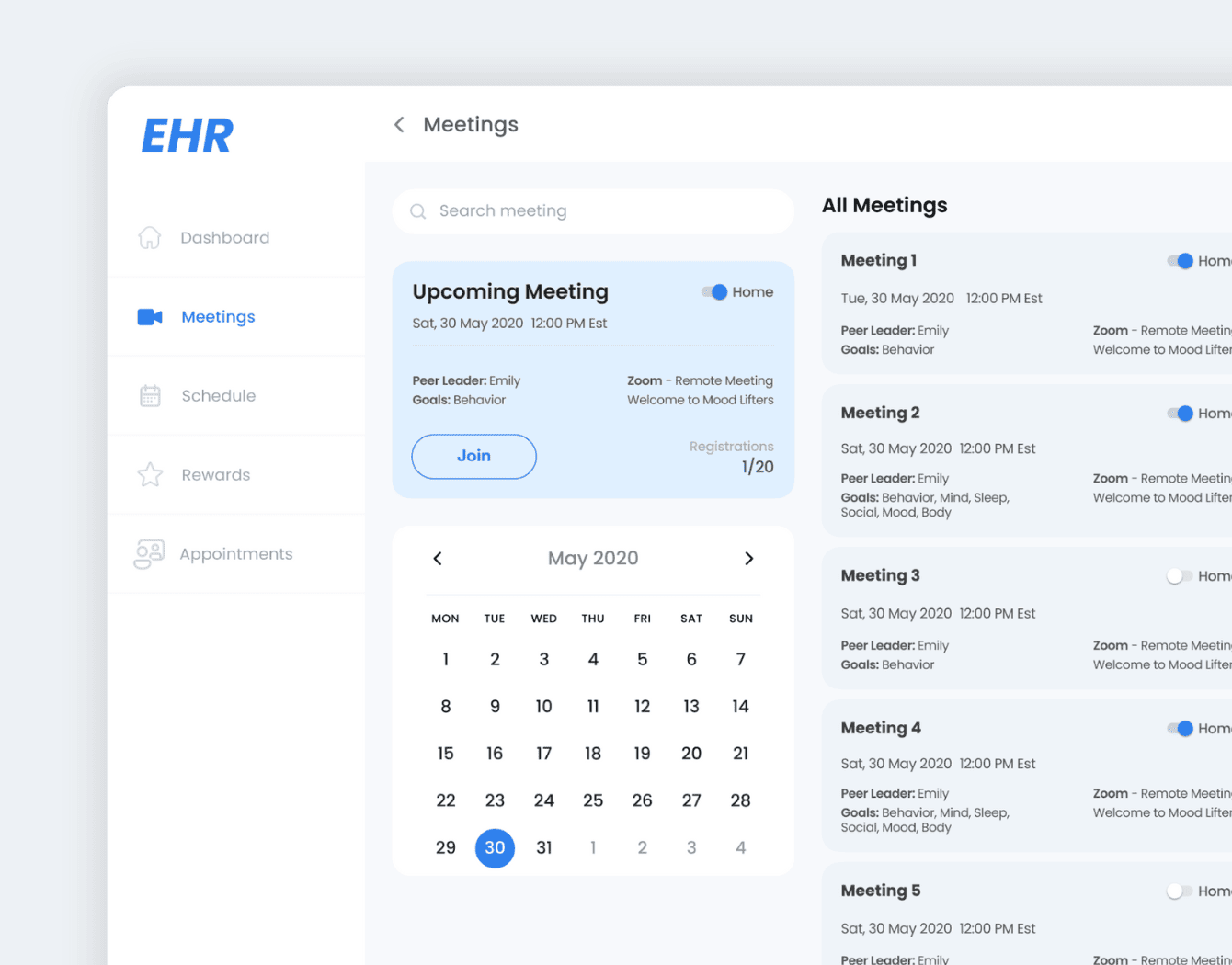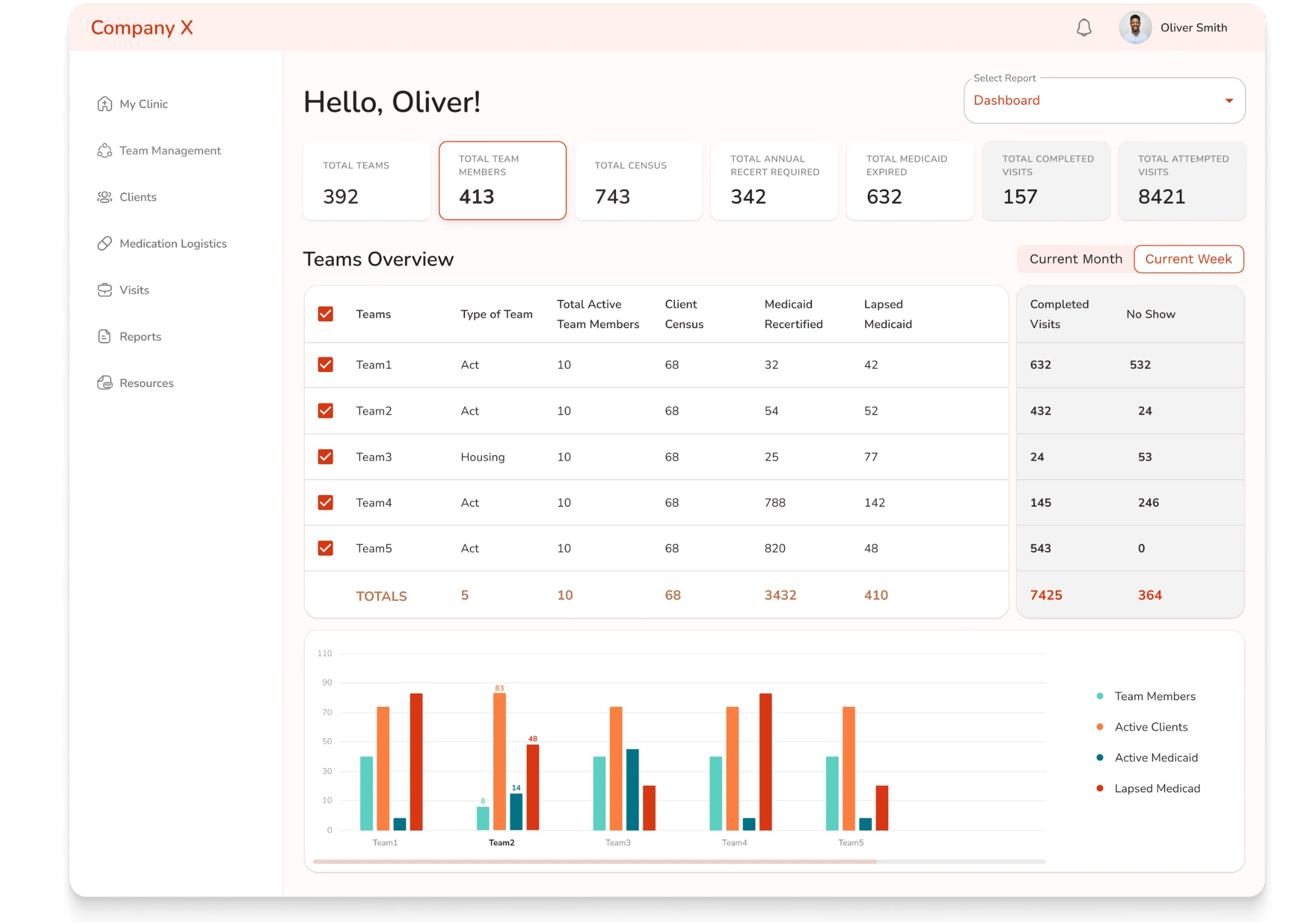The decision to adopt any electronic health record (EHR) system is one of the most crucial ones since it affects the way care is provided in terms of quality and regulatory compliance. An EHR is the foundation of a healthcare facility that determines what processes are automated and how.
If you choose between the top electronic health record systems, chances are you consider Cerner / Epic systems. No wonder. Cerner and Epic are leaders in the healthcare industry and together control over 50% of the US market. These two systems have been in the field for decades, with Cerner purchased by Oracle Corporation and renamed to Oracle Health in 2022. This merger has made Cerner an even more significant player with advanced cloud capabilities.
Our analysis highlights the advantages and disadvantages as well as the basic features of the two systems, helping you understand the Cerner vs. Epic pros and cons to choose the one that would suit your organization best.
Epic vs. Cerner: The Impact of Choosing the Right EHR System for your Healthcare Facility
EHR software affects the workflows in your facility, regulatory compliance, and the overall quality of services. It also determines where health data resides, what patient data is collected for electronic health records, and the insights medical staff can get from the information gathered.
Suppose you make the wrong choice and adopt a system with poor security measures. Then, your medical organization may suffer from data leakage and face millions of financial losses because of penalties. The trust of patients will also be undermined. Given that in 2023, 725 data breaches were reported to the Office for Civil Rights, the problem of electronic health records exposure is huge.
The wrong EHR may also alter your daily operations and make it impossible for you to implement new technologies in the future. Poor interoperability means you cannot reuse data between systems, or the transition is very complicated. So, you should always consider the integration potential of the system, given existing clinical systems and the projected future policies and technologies.
It is also crucial to choose electronic health records solutions that offer strong support and training. Therefore, adopting well-known systems, like Epic or Cerner, helps avoid the challenges of transition and minimizes disruption to patient care processes. Epic and Cerner (Oracle Health) also ensure regulatory compliance and the ultimate level of security with a broad selection of modules and features.
Why Choose Between Cerner (Oracle Health) and Epic
Cerner and Epic electronic health records are popular with the largest and most respected healthcare institutions globally. The best things about these systems are their reliability, decades of experience, and extensive support with regular updates. These EHRs are evident hospital market share leaders, serving a significant share of healthcare facilities.
- Market Leadership Cerner vs. Epic : Epic, the largest ERS vendor in the world, has a slight edge over Cerner in terms of global market coverage. Epic covers 37.7% of the U.S. hospital EHR market share, and Cerner has a 21.7% hospital market share.
- Well-Known Users Cerner vs. Epic: Renowned Cerner users include Kaiser Permanente, Northside Hospital Atlanta, IU Health Methodist Hospital. Epic clients include the Mayo Clinic systems, Cleveland Clinic, and Johns Hopkins Medicine.
- Unique Market Niche Cerner vs. Epic: Epic focuses on custom EHR development and AI tools while Cerner is mainly about integration and data management for public health.
When it comes to EHR systems, there is a common debate between choosing Cerner vs. Epic. Epic is very popular among large healthcare organizations needing advanced customization, while Cerner is more cost-effective and suitable for practices of different sizes, from small healthcare providers to large hospitals. The pricing of Cerner PowerChart Ambulatory EHR starts at $25 per user per month, making it an affordable option, though it lacks a free trial or version, which can affect the risk assessment for healthcare providers. Learn more about the differences and use cases in the following section to decide which EHR may be better for your practice.
Contact our team to get free consultation on EHR and EMR Integrations, or learn about the development of custom solution.
Contact UsComparison of Cerner and Epic EHR Systems
Epic and Cerner are both amongst the top EHR systems but have some differences that make them more effective for different uses. Here we overview the capabilities that will affect your choice of an EHR system the most. Learn how these two EHR giants differ in functionality, security, user experience, interoperability, compliance, cost, and other key aspects.
Main Features and Product Offerings Cerner vs. Epic
Epic electronic health records system sells licenses for multiple modules covering different healthcare fields, including dental, orthopedics, urology, cardiology, oncology, and nephrology, and performs advanced analytics aimed at predictive and proactive care. Cerner better serves facilities with less complex and specialized needs. It outperforms Epic in interoperability and analytic capabilities.
Cerner EHR System: Key Features
| Data Interoperability | Cerner’s EHR system offers robust product offerings and a user-friendly experience, effortlessly transferring patient data across various applications. |
| Strong cloud support | Being a part of Oracle, Cerner has advanced cloud capabilities. |
| Real-time analytics | The system generates data-driven insights that improve clinical decisions. |
Epic EHR System: Key Features
| Exhaustive records | Patient records are highly detailed, covering everything from in-hospital stays to outpatient visits with Epic charting. |
| Intelligent decision-making | AI-powered insights are delivered to help you make better clinical and operational decisions. |
| Specialized | It has features that are great for individually tailored departments such as oncology, pediatrics, and cardiology among others. |
User Experience and Interface Cerner vs. Epic
Key factors that significantly impact the effectiveness and precision of healthcare processes are user experience and the interface of an EHR system. A properly constructed interface ensures an easier learning curve and facilitates everyday procedures by making information on patients’ needs more accessible. User experience is also important in reducing errors and improving user satisfaction.
Cerner user experience and interface
Cerner is generally easier to use than Epic and requires less time to start for beginners. Still, the reviews vary, with some people complaining about Cerner’s complexity. Cerner’s EHR system is noted for its comprehensive functionality, but it faces criticism regarding its interface design and navigation complexities. However, Cerner’s efforts to improve interoperability through collaborations like the CommonWell Health Alliance and its APIs play a crucial role in the overall effectiveness of the system.
Epic user experience and interface
Epic is considered a more challenging system to master due to its extensive functionality. Be ready to spend more time on training.
Interoperability and Integration Cerner vs. Epic
Integration and interoperability enhance communication across healthcare systems and providers. The CommonWell Health Alliance plays a crucial role in promoting interoperability by establishing standards and procedures that facilitate the access and sharing of patient data among member organizations. Efficient information sharing improves patient outcomes and ensures better cooperation for healthcare professionals. Both Epic vs. Cerner allow exchanging of real-time data between users and integrate with many other platforms, services, and devices, eliminating patient data silos.
Cerner integration capabilities
Cerner allows healthcare providers to aggregate data from multiple sources easily and is highly flexible. The core integration tool is Ignite API.
Epic integration capabilities
Comparing Cerner and Epic, Epic has a more structured approach to third-party integrations but may be more challenging to connect with non-Epic systems. Strong FHIR support and specialized tools for integration, such as EpicCare.
Security and Compliance Cerner vs. Epic
Security and compliance are crucial to protect sensitive patient information within any electronic health record system. Both Cerner and Epic offer encryption of information, support multi-factor authentication, and provide complete audit trails, among other standard security measures. Cerner and Epic also follow the core regulations in healthcare, such as HIPAA which requires strict privacy and security protections, and HITECH, which encourages the appropriate use of health IT systems.
Cerner security and compliance measures
Cerner meets all core standards with more third-party security certifications, which may matter for compliance.
Epic security and compliance measures
Epic incorporates core security measures, including encryption and multifactor security logins, and meets all major healthcare regulations.
Scalability and Customization Cerner vs. Epic
When choosing an EHR system, scalability and customization should be key considerations because they determine how well the solution can adapt to a healthcare organization’s inevitable changes. Epic vs. Cerner offer scalable systems but focus on different aspects. Epic has a reputation for being able to cater to large hospitals and offers organizational customization across various workflows and requirements. Cerner is also scalable, although it’s more standardized for small and medium-scale healthcare facilities.
Cerner scalability and customization options
Cerner EHR has sufficient scalability for healthcare organizations of different sizes but is less customizable than Epic.
Epic scalability and customization options
Epic EHR has excellent elasticity and is suitable for enterprise-level use with great possibility for customization.
Support and Training Cerner vs. Epic
Comprehensive support and training directly affect the efficiency of EHR implementation and usage among healthcare professionals. You must train the staff to adopt a system and organize regular training to improve their skills and learn new features. Fortunately, Cerner and Epic include various training programs as well as other supporting services for their users. Cerner EHR is also good at providing constant support, but reviews about the quality vary.
Cerner’s support and training
Cerner EHR provides a detailed fit-in and constant help, but the reviews on the quality of the support are mixed.
Epic’s support and training
Epic EHR has multiple training packages, a lot of help, and high user satisfaction with the support provided.
Cost Analysis Cerner vs. Epic
For many healthcare organizations, the cost of deploying and sustaining an EHR system is a huge consideration since it usually exceeds millions of dollars. The budget will depend on the size of a healthcare facility, the type of deployment (cloud vs. on-premise), and customization. Epic EHRs are quite expensive, and costs for a large hospital often start at $1.2 to $2 million considering their extensive features, system customizations, and scalability. Cerner, at the same time, is more affordable and therefore cost-effective for small and mid-sized organizations, with costs often starting from approximately $500,000. However, additional costs must be factored in such as training, implementation, and support.
Cerner EHR pricing
Cerner is more suitable for smaller organizations, considering it is less costly and has offerings for practices of different sizes.
Epic EHR pricing
Epic is more expensive, with costs reflecting its advanced features and scalability.
Customer Support and Satisfaction Cerner vs. Epic
Customer support and satisfaction are critical factors when evaluating EHR systems. Both Epic and Cerner are renowned for their customer support, but they have distinct approaches that cater to different needs.
Epic Customer Support and Satisfaction Ratings
Epic is highly regarded for its exceptional customer support, boasting a satisfaction rating of 95% among its users. Epic’s support team is available 24/7, offering assistance with technical issues, training, and ongoing maintenance. Additionally, Epic provides a comprehensive online resource center, which includes tutorials, webinars, and other educational materials to help users maximize the system’s potential. This robust support infrastructure ensures that healthcare providers can rely on Epic for continuous, high-quality assistance.
Cerner Customer Support and Satisfaction Ratings
Cerner provides a robust support system that includes 24/7 customer service, which is crucial for healthcare organizations needing immediate assistance. The support team is equipped to handle various technical issues, providing comprehensive solutions to ensure smooth operations. Cerner’s user satisfaction ratings are generally positive, although there are some mixed reviews regarding the timeliness and effectiveness of support in high-demand situations.
In addition to direct support, Cerner offers extensive training resources, including webinars, tutorials, and on-site training sessions to help healthcare providers maximize the functionality of their Cerner EHR systems. However, some Cerner users have noted that the availability of training materials and support can vary depending on the size and needs of the organization, with smaller healthcare facilities sometimes facing challenges in accessing the same level of support as larger institutions.
Moreover, Cerner’s commitment to continuous improvement is evident through its regular software updates and enhancements, which address user feedback and adapt to the evolving needs of the healthcare industry.
| Category | Cerner | Epic |
| Company Overview | Founded in 1979 and now part of Oracle Health with solid integration and population health management capabilities. | Founded in 1979, Epic is known in the market for revolutionizing AI tools, processes, and modules for specific specialties. |
| Market Share | 21.7% of US hospitals | 37.7% of US hospitals |
| Core Functionality | Focus on interoperability and access to real-time data. | Optimizes workflows and provides predictive data analytics. |
| Deployment Models | On-premises with rapidly scaling Cerner Millennium cloud system | On-premises with cloud options in Epic Cloud |
| User Experience | Simpler and more intuitive but lacks some features. | More difficult to learn but offers extensive functionality when mastered. |
| Customizability | Moderate customization capabilities, much more limited than Epic. | Broad customization options available for specific requirements. |
| Interoperability and Integration | Strong interoperability and real-time information sharing with external systems. | Seamless integration within its ecosystem but less so for external sharing. |
| Security and Compliance | Full compliance with HIPAA, HITECH, and other patient data security standards. | Full compliance with HIPAA, HITECH, and other patient data security standards. |
| Support and Training | Good support, but Cerner users report gaps in training resources and limitations for smaller organizations. | Strong customer support and many training programs. Support issues may arise during high-demand periods. |
| Cost | Cheaper for small companies as there are various pricing options. | High cost of maintenance and implementation; suitable for bigger organizations. |
| Best For | Small facilities, community hospitals, and organizations that need predominantly cloud-based systems. | Big medical systems with advanced specialties and practices that require better customization. |
| Weaknesses | Lacks advanced features a large healthcare facility may need. | Expensive and takes a lot of time and effort to implement. |
Your next read: EHR and Medical Billing System Combination for Optimized Claim Management and Payments
Cerner vs. Epic Pros and Cons
There are definitely strong and weak sides to both Epic and Cerner, you should know when considering the potential of these systems for your healthcare organization. While Cerner is best known for its data interoperability and real time accurate data capabilities, Epic EHR system is famous for its specialty-specific modules. A critical evaluation of the advantages and disadvantages of Cerner and Epic allows you to determine which EHR will meet your operational requirements and challenges.
Cerner EHR Pros
- Cerner’s large focus on interoperability allows it to easily connect to numerous external systems.
- The support of FHIR and HL7 means real-time patient data transfers between different healthcare providers.
- Population health management enables healthcare organizations to track audiences successfully. Healthcare professionals can analyze large volumes of patient information, spot health issues, and enhance results through targeted interventions.
- Cerner’s cloud-based healthcare software solutions have been further strengthened by the merger with Oracle, offering healthcare organizations of various sizes robust analytics and security.
Cerner EHR Cons
- Insufficient capacity for enterprise-level healthcare organizations with multiple departments compared to Epic EMR
- Users report that how they use the system and adjust their workflow can impact efficiency because of occasional issues.
- Cerner users also say that although its integration features are good, the training and support are sometimes inadequate, resulting in longer periods of staff adaptation.
Epic EHR Pros
- Epic EHR system is highly scalable and configurable, which makes it suitable for large health systems with multiple types of medical services.
- The analytics tools embedded in the Epic EHR system are powered by AI, which allows healthcare providers to make clinical decisions using predictive analytics.
- Epic has integrated modules for all major specialties and, therefore, specific medical problems are effectively catered for.
- The patient’s MyChart portal improves patients’ involvement in their treatments as it provides easier access to personal health records.
Epic EHR Cons
- Epic EMR’s greatest disadvantage is its installation cost and operational expenses, which make it inaccessible to smaller healthcare organizations.
- Extensive customization options can cause complexities, requiring significant time and resources for setup.
- Epic EHR system has more limitations in terms of third-party information exchange than Cerner.
- Some Epic EHR users have also reported challenges obtaining quick and consistent support for troubleshooting and system updates.
How to Choose an EHR System: 7 Factors to Consider
It is essential to note that, selecting an EHR system that would best fit an organization is not as straightforward as it may seem. You must analyze your organizational needs and software characteristics to make the right choice.
Integration With Existing Systems
An effective EHR must integrate easily with your existing systems and functions, laboratory, imaging, and pharmacy databases, as well as the software you may need to integrate in the future like revenue cycle management or telehealth. The healthcare industry is highly dependent on technology, so you need an EHR that would allow you to quickly connect new apps to stay competitive. Systems like Cerner are known to collaborate very well with third-party apps and facilitate seamless connections and data exchange with other healthcare systems. This capability is vital to organizations that liaise with other providers and work within multiple sites.
Learn more in our article: EHR Interoperability – Are We There Yet? A Look at Progress and Barriers
Ease of Use
Prefer an EHR that is easy to use and self-explanatory enough that minimal training is required for easy onboarding. You must ensure the system requires a minimum number of clicks to complete everyday tasks from medical staff, administration, and patients. It ‘s also important to pick a system with role-based access since it allows you to customize the functionality for each user. This way, different user groups will see only the needed features and have a smoother experience.
Potential for Growth
Healthcare institutions should consider whether an EHR can grow with their changing requirements. Even though on-premise EHR installation is still popular due its higher security and independence, cloud wins hearts with its flexibility. The cloud-based deployment enables healthcare systems to expand their capacity seamlessly to serve more patients. Epic’s scalability is quite huge, making it more suitable for big organizations with many specialty practices. Its customization options are no less important, as they allow organizations to modify the system ‘s characteristics to fulfill specific needs.
Cost of Implementation and Maintenance
EHR acquisition costs include licensing, implementation, training, and maintenance. Infrastructure and hardware costs also significantly affect the budget since they usually require big upfront and ongoing expenses. Cerner offers less expensive options compared to Epic EHR system that can suit the needs of smaller organizations, although its advanced features considerably increase the cost. For instance, population health management and customizable data analytics. Before choosing an EHR, you must estimate how much you can spend on digitizing your healthcare practice and engage specialists to calculate long-term expenses and what you can afford.
Data Security and Compliance
An EHR system must meet several regulatory requirements such as HIPAA, HITECH Act, and PCI DSS (for the US) and General Data Protection Regulation (for EU). It should also comply with ISO quality standards, including ISO/IEC 27001:2013 and state specific regulations like California Consumer Privacy Act if they apply. Security measures also matter. Make sure an EHR has multi-factor authentication, encryption, and detailed access controls that limit data usage according to user roles. It must also support audit trails tracking who accessed data and what changes were made, among other measures. Fortunately, Epic and Cerner are highly compliant and secure, so you should mainly worry about these aspects when choosing a less established system among Epic and Cerner competitors.
Both Cerner and Epic have made substantial capital investments in security features aimed specifically at the healthcare sector. For instance, Epic includes multi-factor authentication, encryption, and detailed access controls that limit data usage according to user roles. Furthermore, the Epic audit trails provide the tracking of who accessed data and what changes were made. In the same way, Cerner is using Oracle ‘ ‘s cloud which has data encryption, intrusion detection systems and periodic compliance checks to meet the requirements of HIPAA and HITRUST.
Have a question regarding EHR and EMR integration or security compliance? Out tech team can help.
Schedule a CallVendor Support and Regular Updates
It is essential to have good customer support and timely software upgrades for its long-term efficient operation. Some important aspects are 24/7 access to support teams, fast and efficient problem-solving procedures, proper communication, and straightforward training materials. Regular updates also improve security, system functionality and enable legally compliant comprehensive EHR solutions for the current requirements of the healthcare industry. So, make sure to ask an EHR provider about its support options before committing to using their system.
Specialty Modules and Features
In the case of organizations with specific care needs, the existence of appropriate modules is an important parameter. While comparing Epic and Cerner, focus on functionalities most beneficial for your organization. Epic EHR has exceptional oncology, pediatrics and cardiology modules which perfectly suit multispecialty clinics. These include clinical decision support, documentation tailored to specific body locations, and workflows for specific common procedures. Cerner emphasizes population health management and real-time reporting, which primarily serve multi-site facilities and the public health sphere.
Your next read: All You Need to Know About EMR/EHR Implementation Process
Empeek’s Experience With Custom Healthcare Software Development
Mental Health EMR/EHR Software Development
We have built a custom EHR system for behavioral health providers with advanced scheduling, patient management, and reporting capabilities. The application allows professionals to concentrate on care leaving administrative tasks to software. This EHR transforms care and the complexity of operations within mental health practices. Learn more about the case study here.

HIPAA-compliant Digital Mental Health Solution
At Empeek, we partnered with Vello Health to transform mental health care delivery by developing their innovative, HIPAA-compliant collaboration platform for ACT (Assertive Community Treatment) teams. Leveraging our expertise in .NET, React, and React Native, we designed and implemented a comprehensive solution to address the unique challenges of real-time workflows in community care. Our contributions included creating mobile and web applications that streamlined team-based collaboration, secure HIPAA-compliant messaging, and real-time crisis planning. We engineered a custom offline geocoding service to overcome geolocation challenges while maintaining budget constraints and data privacy. Through our efforts, Vello Health achieved seamless EMR integration, actionable analytics, and enhanced operational efficiency, enabling ACT teams to deliver timely, effective care. Our proactive enhancements and ongoing support continue to drive measurable results, including a 109% increase in average billing PCPM for clients and a significant reduction in patient no-shows.

Conclusion: Epic vs. Cerner?
Choosing between Cerner and Epic influences patient treatment, efficiency, and future development of hospitals and healthcare centers. Every option has distinct pros and cons. While Cerner provides lower costs and interoperability, which makes it a great choice for small organizations, Epic EHR is well-known for ease of use, customization, and advanced features for deployment in large hospitals and multi-specialty clinics.
The benefits accrue only if the right choice is made that fits the healthcare facility’s size, goals, and budget. Therefore, you must analyze such parameters as practicality, expenses, and your practice size to understand the real EHR value over time. The focus should not only be on how to harness technology by selecting the most appropriate EHR system but also on how to use that system to improve care, enhance patient experience, and reach greater efficiency.
Boost your EHR Capabilities With Empeek
We enable healthcare organizations to make the most out of EHR systems.








